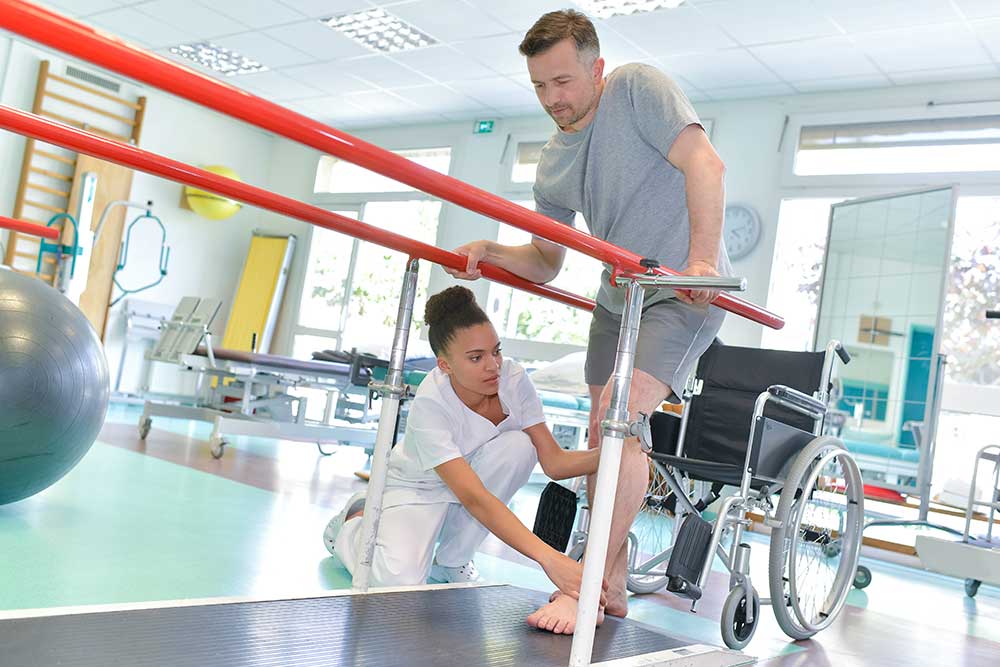Disclaimer: The information on our website is provided for general information purposes only. We make no representations or warranties of any kind, express or implied, about the completeness, accuracy, reliability, suitability or availability with respect to the website or the information contained on our website for any purpose. Any reliance on such information is therefore strictly at your own risk and we are not liable for any damages or losses arising out of or resulting from your reliance on any information contained on our website.
A physical therapist (also called PTs), specialize in physiotherapy, also known as physical therapy. A physical therapist helps people of all ages to rehabilitate injuries focused on the musculoskeletal system. They diagnose, treat, and provide holistic care of patients who have physical or physiological problems. The conditions they treat range from impairments, deformities, physical ailments, disabilities to emergency needs which are purely physical in nature.
Watch a video to learn what a physical therapist does.
How to Become a Physical Therapist
To become a physical therapist, you must graduate with a Doctor of Physical Therapy degree. The DPT degree is the most accepted qualification for a professional to become a physical therapist. Not every physical therapist is a doctor; the doctorate degree requirement to practice is fairly new and some physical therapists may still practice with a master’s degree.
Some health care centers accept people with other degrees in medical science to become an associate or an assistant to a physical therapist. However, no other degree than one in physical therapy would be acknowledged for anyone to become a physical therapist.
Job Description of a Physical Therapist
Usually, a physical therapist would deal with musculoskeletal problems but not those that have correlated venous problems or conditions of the nerves. Physical problems such as skeletal injury, muscular cramps, physical impairments (including all types of physiological disabilities), and all kinds of diagnosis, treatment, and care pertaining to these conditions fall within the purview of a physical therapist.
A physical therapist may recommend appropriate medications and offer emergency and long term therapies. A physical therapist may also offer his or her expertise to other doctors in complicated cases that involve surgery or intensive operations. A physical therapist may also have his or her own practice, work for a healthcare center, or at a public or private hospital. A physical therapist may also cater to sportspersons and athletes.
Physical Therapist Career Video Transcript
People recovering from accidents or disease, or who just want to stay active as they age, call on the skills of a physical therapist to help them manage their pain, grow stronger, and become more mobile. Physical therapists, also called PTs, work with people of all ages who have pain or limitations from a variety of sources, including injuries, amputations, strokes, or illness.
Physical therapists design an individualized plan for each patient using exercises, stretching, massage, and hands-on therapy. They also teach patients to use equipment like canes or prosthetics. They always review a patients’ medical history before making a plan, then track patients’ progress during the course of treatment.
Educating patients and their families about what to expect from the recovery process is a critical part of this job. Physical therapists work on a team of health care professionals and oversee the work of physical therapy aides and assistants. They work in clinics, hospitals, home health care, and nursing homes, and may specialize in areas like pediatrics or sports medicine. Lifting and moving people and heavy objects are all part of the day’s work. To enter this career, you will need a Doctorate of Physical Therapy and a state-issued license.
This field provides the deeply satisfying experience of helping people to regain abilities they have lost, manage pain, and live their lives more fully. Produced by CareerOneStop. CareerOneStop is sponsored by the U.S. Department of Labor, Employment and Training Administration.
Article Citations
Bureau of Labor Statistics, U.S. Department of Labor, Occupational Outlook Handbook, Physical Therapists.
National Center for O*NET Development. 29-1123.00. O*NET OnLine.

